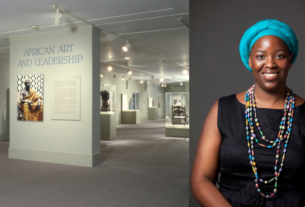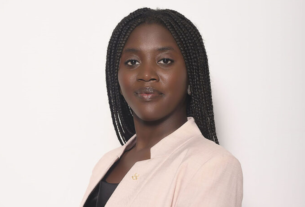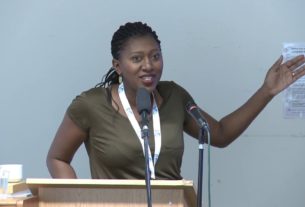The 3 centres are part of the Consultative Group on International Agricultural Research (CGIAR), a global partnership of international organisations involved in food security research that includes 15 research centres, donors and advisory bodies.
Dr. Simeon Ehui from Côte d’Ivoire has been appointed Director General of the International Institute of Tropical Agriculture; Professor Appolinaire Djikeng from Cameroon has been appointed Director General of the International Livestock Research Institute (ILRI), the first African to hold this position. For her part, Eliane Ubalijoro is the new President and CEO of the Center for International Forestry Research and World Agroforestry (CIFOR-ICRAF) and the new Director General of ICRAF. She becomes the first African woman Director General of a research centre of the Consultative Group on International Agricultural Research (CGIAR) and CEO of two centres in the 60-year history of the CGIAR.
Appolinaire Djikeng appointed Director General of The International Livestock Research Institute
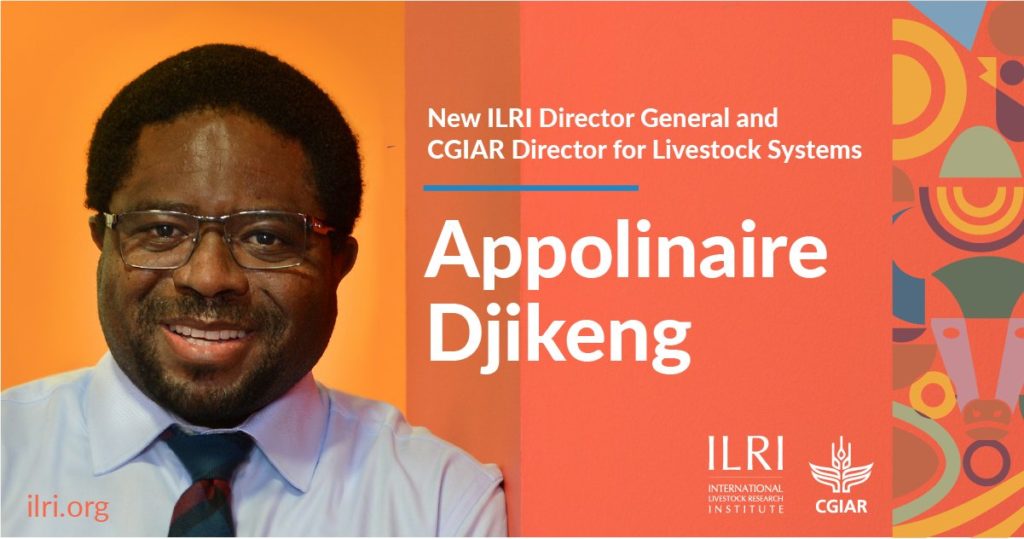
The International Livestock Research Institute (ILRI) Board of Trustees and the Consultative Group on International Agricultural Research (CGIAR) have appointed Professor Appolinaire Djikeng as Director General of ILRI and CGIAR Senior Director of Livestock-Based Systems.
Professor Djikeng was born in Cameroon and is the first African to be appointed Director General of ILRI. He will assume the post on April 3, 2023. He will take over the role from Dr. Shirley Tarawali, who is currently interim Director General at ILRI. Dr. Tarawali assumed the lead from Dr. Jimmy Smith, who retired in December 2022 after 11 years of leadership.
The International Livestock Research Institute (ILRI) works for better lives through livestock in developing countries. ILRI is co-hosted by Kenya and Ethiopia, has 14 offices across Asia and Africa, employs some 700 staff and has an annual operating budget of about USD80 million.
CGIAR is a global research partnership for a food-secure future. CGIAR science is dedicated to transforming food, land and water systems in a climate crisis. Its research is carried out by CGIAR Centers/Alliances in close collaboration with hundreds of partners, including national and regional research institutes, civil society organizations, academia, development organizations and the private sector
ILRI is a CGIAR research centre, a global research partnership for a food-secure future. CGIAR science is dedicated to reducing poverty, enhancing food and nutrition security, and improving natural resources and ecosystem services. Its research is carried out by 15 CGIAR centres in close collaboration with hundreds of partners, including national and regional research institutes, civil society organizations, academia, development organizations and the private sector
Globally-recognized expert
Professor Djikeng, a globally-recognized expert, has close to 20 years’ experience leading multi-disciplinary, multi-institutional and global research and development programs focusing on agricultural development and human health. He holds a Doctor of Philosophy (PhD), Molecular Parasitology, from Brunel university (London).
In his new role, he will expand ILRI’s proven track record of impact, developing livestock sustainable systems that help nourish and sustain millions of people in low- and middle-income countries. He will provide leadership and coordination of activities related to livestock systems across CGIAR and be part of the CGIAR Senior Leadership Team. Professor Djikeng joins ILRI and CGIAR from the University of Edinburgh, where he is currently Professor and Chair of Tropical Agriculture and Sustainable Development, as well as the Director, Centre for Tropical Livestock Genetics and Health (CTLGH) based at the Roslin Institute. He will retain his affiliation with the Roslin Institute of the University of Edinburgh to strengthen the partnership with ILRI and the CGIAR system. Professor Djikeng previously worked with ILRI from 2009-2016 as Technology Manager and then Director of the Biosciences eastern and central Africa (BecA)-ILRI Hub.
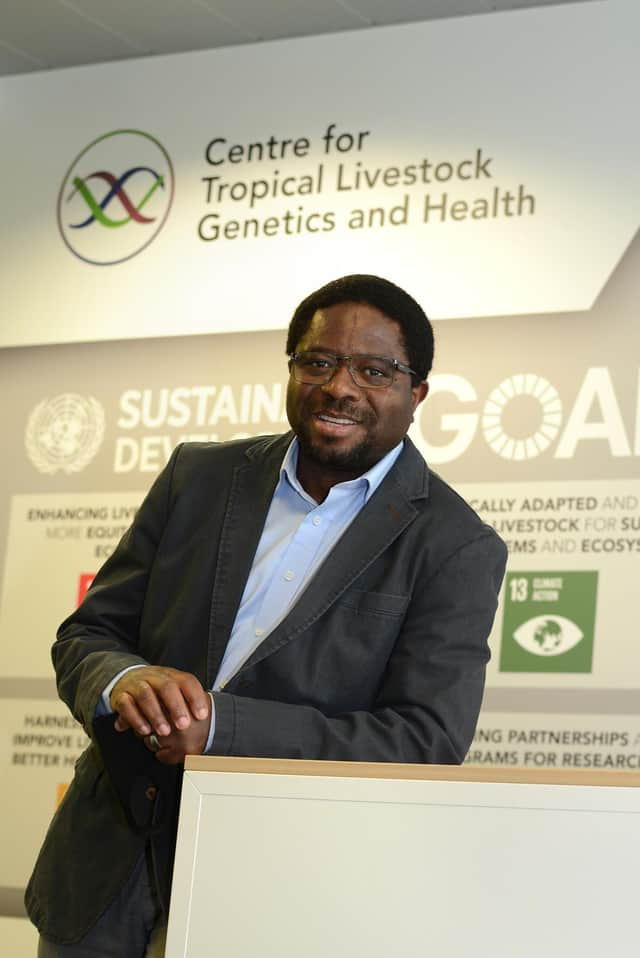
Key research
Between 1999 and 2009, he conducted research at Yale University and the J. Craig Venter Institute focusing on infectious diseases, regulation of gene expression, mechanism of RNA interference, functional genomics of African trypanosomes (as key pathogens of humans and livestock animals), infectious and zoonotic diseases, technology development for multiplex viral genome sequencing and metagenomics. From 2009 to March 2017, based in Nairobi-Kenya, in his roles first as Deputy and then as Director of Biosciences eastern and central Africa (BecA), he built research and support teams, mobilized resources, developed innovative partnerships (with donors, research institutions, universities and national programs in LMICs) to establish and operate a leading biosciences research for development program currently operating as a key contributor to agricultural development and food safety in African. While at BecA, his research interests included livestock genetics, diversity assessment to support breeding/selections programs, animal health
From April 2017, he moved to the University of Edinburgh with appointments as Director of the Centre for Tropical Livestock Genetics and Health, and Professor and Chair for Tropical Agriculture and Sustainable Development.
Professor Djikeng has received numerous awards, including the 2020 Nelson Mandela Justice Award. He was also recognized by the Decade of Health as one of the 10 people in the United Kingdom changing health.
Deeply committed to the mission of ILRI and CGIAR.
Professor Appolinaire Djikeng said: ‘‘I am deeply committed to the mission of ILRI and CGIAR. Livestock development is very close to me personally and it is a huge honor and privilege to take the helm of the world’s leading livestock research and development organisation, focused on improving outcomes for farmers, addressing challenges related to our environment and the sustainable use of natural resources, and delivering solutions to our increasingly vulnerable food systems.”
Dr. Elsa Murano, the Chair of ILRI’s Board of Trustees, said: “Livestock is the fastest growing sector in agriculture, and it is essential that its growth is sustainable and equitable. Professor Djikeng’s research has been at the forefront of efforts to improve livestock systems and animal productivity for low- and middle-income countries. We are delighted to welcome a high-profile scientist and leader of Professor Djikeng’s calibre whose exemplary leadership skills and scientific expertise will drive ILRI’s continuing success.”
Dr. Claudia Sadoff, CGIAR Executive Managing Director, said: “Transforming food, land and water systems cannot be done without sustainably transforming the livestock sector. Livestock systems play a central role in CGIAR’s research agenda and Professor Djikeng’s record of strategic innovation, impact and cross-cutting research perfectly position him to champion livestock across CGIAR.”
Dr Eliane Ubalijoro appointed Chief Executive Officer of CIFOR-ICRAF
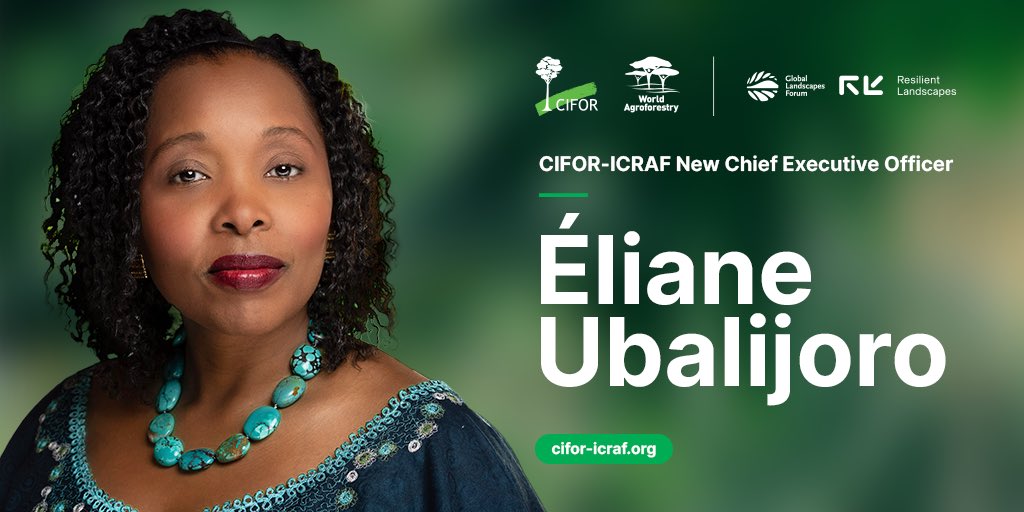
The Board of Trustees for the Center for International Forestry Research and World Agroforestry (CIFOR-ICRAF) has announced, on January 17, the appointment of Eliane Ubalijoro as Chief Executive Officer (CEO) of CIFOR-ICRAF and Director General of ICRAF. Eliane Ubalijoro will be the first African woman Director General of a CGIAR Research Center and CEO of two Centers in CGIAR’s 60-year history. Dr. Ubalijoro’s appointment will starting on May 2023.
CIFOR-ICRAF, which merged in 2019, is the world’s leading authority on forest and agroforestry landscapes. It has partnerships in 64 countries, 159 funding partners and 192 active projects, alongside more than 2,200 completed projects across 92 nations. The organisation has an annual budget of USD 100 million,, and a combined legacy investment of USD 2 billion in research and technology, policy and development. On average, CIFOR-ICRAF research is cited nearly 137 times a day, and appears in global media more than 3,000 times per year.
Innovation, gender, and sustainable development
Born in Rwanda, Eliane Ubalijoro is the Executive Director of Sustainability in the Digital Age, and Professor of Practice for public-private sector partnerships at McGill University’s Institute for the Study of International Development. She is also a research professor in the Department of Geography, Planning and Environment at Concordia University. Eliane teaches and advises in Leadership programs to help equip executives in science, innovation and international development with tools that support inner and outer sustainable transformation towards global prosperity
Over the past two decades, her research has focused on innovation, gender, and sustainable development. She is interested in combining CIFOR-ICRAF’s wealth of knowledge in forestry, ecology and sustainable agriculture with the transparency that high-resolution satellite data and artificial intelligence can bring to connect with work that aims to increase biodiversity worldwide and ensure transparency in terms of carbon sequestration.
Eliane Ubalijoro said: “I see CIFOR-ICRAF as a critical institution, poised to accelerate its research and impact, leading the way to achieving the 2030 goals by harnessing the potential of forestry and agroforestry to create ecosystems that generate prosperity, sustainably”.
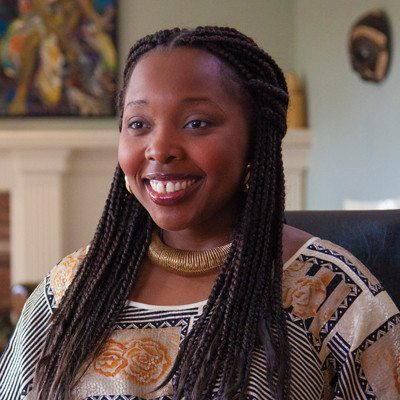
Member of several organizations
Eliane Ubalijoro is a member of the Impact Advisory Board of the Global Alliance for a Sustainable Planet. She is a member of Rwanda’s National Science and Technology Council and has been a member of the Presidential Advisory Council for Rwandan president since its inception in September 2007. She is a member of the Expert Consultation Group on the Post COVID-19 Implications on Collaborative Governance of Genomics Research, Innovation, and Genetic Diversity. Éliane is a member of the African Development Bank’s Expert Global Community of Practice on COVID-19 Response Strategies in Africa. She is a member of the Capitals Coalition Supervisory Board. Eliane is a member of the Advisory Board of the Earth Leadership Program. She is a member of the Advisory Boards of ShEquity and Orango Investment Corporation. Eliane is on the boards of Genome Canada and the Crop Trust.
She has also been an advisor for the final dissertations of six cohorts of the International Masters for Health Leadership, a programme created by Professor Henry Mintzberg. Éliane is on the advisory board of the Earth Leadership Program. She previously served on the Board of Directors of WWF International. She has also been a principal investigator and co-investigator on agriculture and health projects funded by the Bill and Melinda Gates Foundation Grand Challenges Exploration Grants. Before returning to academia, Éliane spent five years as Scientific Director of a Montreal-based biotechnology company, responsible for discovery programs in molecular diagnostics and bioinformatics.
Dr. Simeon Ehui appointed as of Director General of The International Institute of Tropical Agriculture
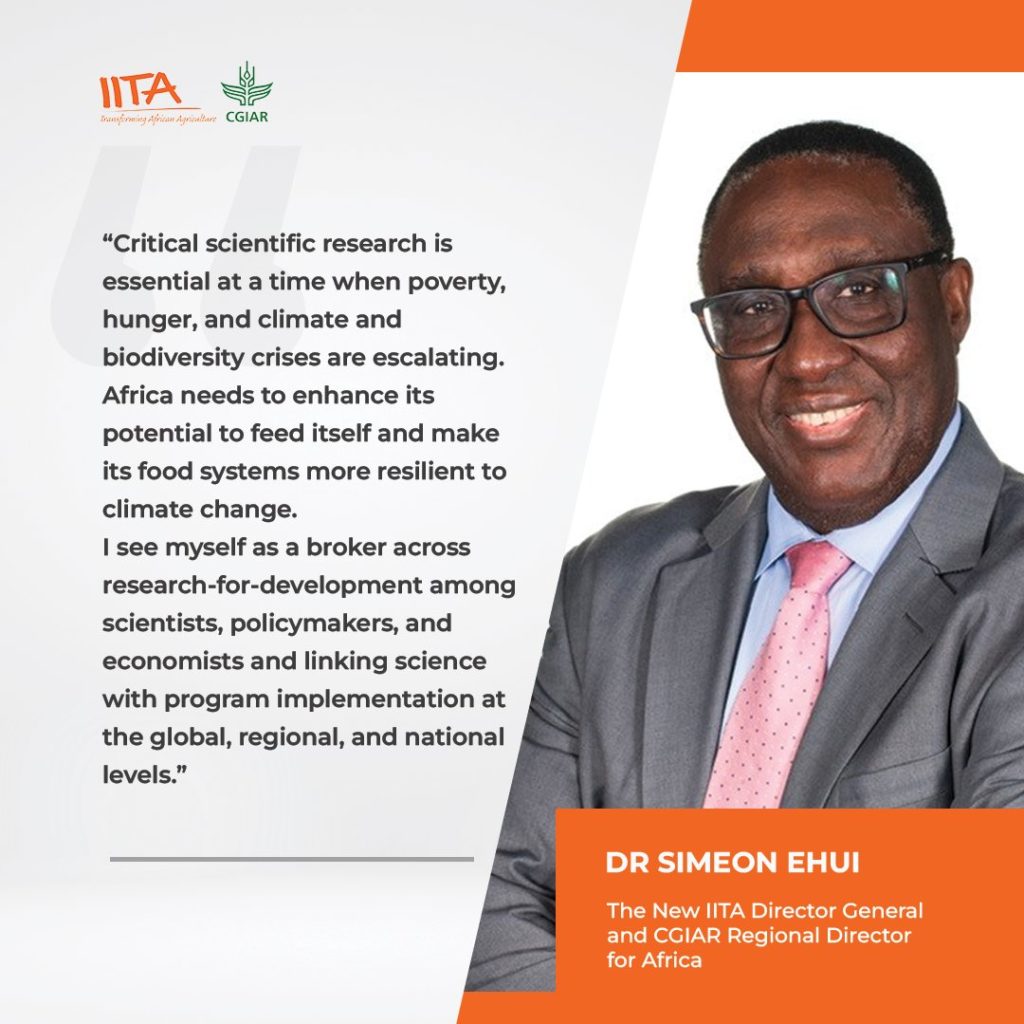
The International Institute of Tropical Agriculture (IITA) Board of Trustees and the Consultative Group on International Agricultural Research (CGIAR) have appointed Dr. Simeon Ehui as Director General for IITA and Regional Director for Continental Africa for CGIAR. Dr. Ehui takes over the role from Dr. Nteranya Sanginga, who is retiring after 11 years of outstanding leadership.
Dr. Ehui’s appointment is effective August 1, 2023. In the interim period, IITA’s Deputy Director General and Director for Research for Development (R4D), Dr. Bernard Vanlauwe, will serve as Director General.
IITA is an award-winning, research-for-development (R4D) organization, providing solutions to hunger, poverty, and the degradation of natural resources in Africa. Since 1967, IITA has worked with international and national partners to improve livelihoods, enhance food and nutrition security, increase employment, and preserve natural resource integrity.
IITA is a member of CGIAR, a global research partnership for a food-secure future. CGIAR science is dedicated to transforming food, land and water systems in a climate crisis. Its research is carried out by CGIAR Centers/Alliances in close collaboration with hundreds of partners, including national and regional research institutes, civil society organizations, academia, development organizations and the private sector
Over 30 years’ experience in agriculture and sustainable development
Dr. Ehui, a national of Côte d’Ivoire, Dr. Simeon Ehui has over 30 years’ experience in agriculture and sustainable development, building a wide-ranging network of scientific research organizations within the CGIAR system, multilaterals, regional bodies and national governments in Africa and beyond.
Prior to joining IITA, Simeon was, since July 2020, Regional Director for Sustainable Development for West and Central Africa at the World Bank, covering agriculture, environment, social, water, urban, and climate. His main responsibility, among other things, is to provide vision, coherence, and focus for sustainable development in West and Central Africa consistent with the regional/country strategies. He previously served as Director of the World Bank’s Food and Agriculture Global Practice (2017-2019). Since joining the World Bank in 2003, Simeon Ehui has held several assignments. He was manager of the Food and Agriculture Global Practice for Africa (2015-2017) and South Asia (2009-2015). He also served as Lead Economist and Sector Leader for the Sustainable Development Network in Nigeria covering a variety of sectors such as agriculture, environment, social, water, urban, transport, and energy.
Before joining the World Bank, Simeon Ehui worked for 15 years in the Consultative Group on International Agricultural Research (CGIAR), managing multi-country agricultural research development programs in Africa and Asia for both IITA and ILRI. He managed multi-country agricultural research development programs in Africa and Asia for both the International Institute of Tropical Agriculture (IITA) and the International Livestock Research Institute (ILRI).
Simeon Ehui holds a Masters (1983) and Ph.D. (1987). in Agricultural Economics from Purdue University, in Indiana, USA, and has published extensively in his field. He also holds a Masters (1981) and Bachelors (1980) in Economics from the National University of Cote d’Ivoire Simeon is an honorary fellow of the African Agricultural Economist Association, and a Distinguished Agricultural Alumnus of Purdue University.

The tasks of his new position
In this role, Dr. Ehui will build on IITA and CGIAR’s proven track record of impact, working with teams and partners to improve livelihoods, enhance food and nutrition security, increase employment, and preserve natural resources across Africa.
Reporting to the IITA Board of Trustees and to the CGIAR Executive Management Team, Dr. Ehui will act as a counterpart to key continent-wide institutions and lead a step-change in the level, relevance, and depth of CGIAR’s presence in Africa. As set out in the Abidjan II communiqué, it is reported, CGIAR signed an important agreement with the African Development Bank, the African Union Commission and the Forum for Agricultural Research in Africa last year, aligning efforts to boost food and nutrition security on the African continent. Dr. Ehui will be a member of CGIAR’s Senior Leadership Team, which helps guide the global partnership.
“Critical scientific research is essential”
Dr. Simeon Ehui said: “I am delighted to take up the role of IITA Director General and Regional Director, Continental Africa at CGIAR. Critical scientific research is essential at a time when poverty, hunger, and climate and biodiversity crises are escalating. Africa needs to enhance its potential to feed itself and make its food systems more resilient to climate change. I see myself as a broker across research-for-development among scientists, policy-makers, and economists and linking science with program implementation at the global, regional, and national levels.”
Christian Borgemeister, Chair of IITA’s Board of Trustees, said, “I am very pleased to welcome Dr. Ehui as the eighth Director General of IITA and as CGIAR Regional Director for Continental Africa. He brings to these roles a passion for IITA’s mission, proven leadership, and deep experience facilitating high-level policy discussions, cultivating major partnerships, and steering transformational projects. With his expertise and track record, Dr. Ehui is well positioned to be a transformative leader and guide IITA and CGIAR in Africa into the future. I also wish to convey my sincere appreciation to Dr. Nteranya Sanginga for his tremendous commitment to IITA over the past 11 years.”
Claudia Sadoff, Executive Managing Director, CGIAR, said, “Africa is central to efforts to achieve global food and nutrition security, and therefore critical to CGIAR’s mission to transform food, land, and water systems in a climate crisis. Early in his career, Dr. Ehui worked at CGIAR and we are delighted that this distinguished alumnus is returning to help advance those goals and build impactful partnerships across the Continent.”

